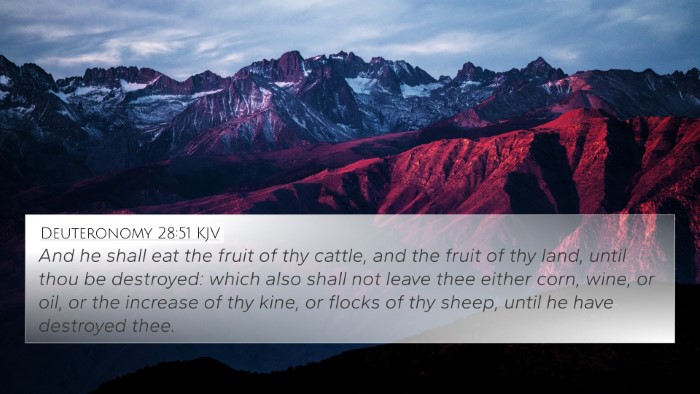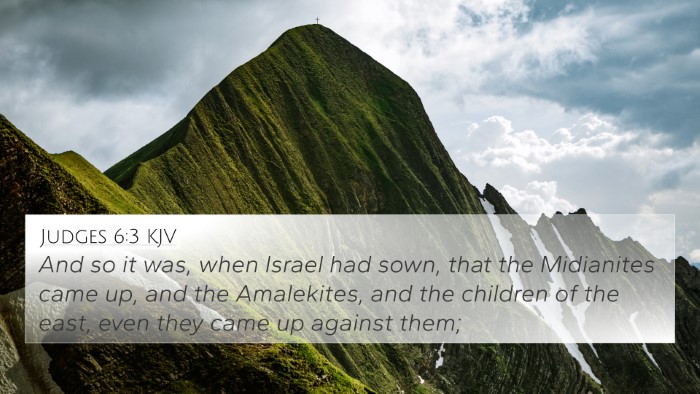Understanding Job 31:8
Job 31:8 states: "Then let me sow, and let another eat; yes, let my harvest be rooted out." In this profound verse, Job is asserting the gravity of his integrity and the implications of living a righteous life. The verse reflects Job's desire for just recompense, and his lamentation represents the broader human inquiry of fairness and divine justice.
Commentary Insights
In exploring the meaning of this verse, we can draw from the insights of notable commentators:
-
Matthew Henry highlights that Job is emphasizing the injustices that accompany a good man's misfortune while others benefit from his losses. He reflects on the reality of life where the righteous often face trials while the wicked prosper, showcasing an inherent imbalance that Job yearns to resolve.
-
Albert Barnes elaborates on this sentiment, suggesting that Job’s statement is a cry against the implications of unfairness that he faces. Job's assertion implies that if he is to be unjustly treated, even his labors should not benefit others, highlighting a deep sense of justice and personal grievance in the narrative.
-
Adam Clarke notes that Job is expressing a wish that his honest labor would not benefit those who do not treat him fairly. This reflects a moral agony where Job desires not just justice for himself but fairness in the larger human context—highlighting the ethical underpinnings of work, reward, and moral integrity.
Bible Verses That Relate to Job 31:8
To understand Job 31:8 further, it is beneficial to explore several Bible verses that provide a thematic link to this profound reflexion on justice and moral integrity.
- Galatians 6:7: "Do not be deceived: God is not mocked, for whatever one sows, that will he also reap." This verse parallels the theme of justice and accountability for one’s actions, resonating with Job’s concern about his labor and its outcomes.
- Proverbs 22:8: "Whoever sows injustice will reap calamity, and the rod of his fury will fail." Here, we see a direct connection to the notion that one's actions have dire consequences, affirming Job’s status as an innocent sufferer.
- Luke 6:38: "Give, and it will be given to you. Good measure, pressed down, shaken together, running over, will be put into your lap. For with the measure you use it will be measured back to you." This New Testament verse reinforces the principle of just recompense, resonating with Job's wish that his yield be reflective of his integrity.
- Job 4:8: "As I have seen, those who plow iniquity and sow trouble reap the same." Reflecting Job's own assertions, this verse captures the theme of retribution based on moral choices.
- Psalm 126:5-6: "Those who sow in tears shall reap with shouts of joy! He who goes out weeping, bearing the seed for sowing, shall come home with shouts of joy, bringing his sheaves with him." This encourages the perspective that sorrow and unjust treatment can ultimately lead to a joyful recompense.
- Isaiah 32:17: "And the effect of righteousness will be peace, and the result of righteousness, quietness, and trust forever." This verse supports the theme of integrity leading to ultimate peace and resolution, akin to Job’s yearnings for justice.
- Job 31:11-12: Further delving into Job’s own words where he relates sexual morality to the consequences of his actions introduces a strong resolve among his declarations of integrity.
Connections Between Bible Verses
When considering connections between Bible verses, we recognize how Bible verse cross-references help illuminate essential truths within scripture. When linking Job 31:8 to related passages, one can achieve greater insight into divine justice and the nature of human suffering.
Tools for Bible Cross-Referencing
To study bible verses that relate to each other effectively, utilizing bible cross-reference tools can greatly enhance your understanding and retention of scriptural themes. A bible concordance or a bible cross-reference guide can assist in identifying connections and thematic parallels.
Conclusion
Ultimately, Job 31:8 serves as a poignant example of the longing for justice in a world where fairness often seems absent. Utilizing both cross-referencing biblical texts and carefully examining related scripture can deepen our understanding of Job’s plight and the timeless truths of divine justice. Exploring the connections between Old and New Testament themes further reveals how these biblical principles are interwoven, offering comfort and insight to believers today.














